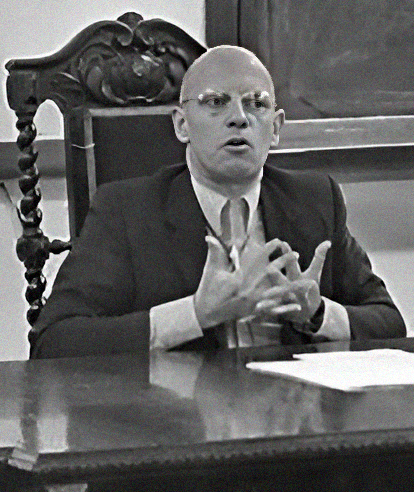Michel Foucault
 Paul-Michel Foucault (, ; ; 15 October 192625 June 1984) was a French historian of ideas and philosopher who also served as an author, literary critic, political activist, and teacher. Foucault's theories primarily addressed the relationships between power versus knowledge and liberty, and he analyzed how they are used as a form of social control through multiple institutions. Though often cited as a structuralist and postmodernist, Foucault rejected these labels and sought to critique authority without limits on himself. His thought has influenced academics within a large number of contrasting areas of study, with this especially including those working in anthropology, communication studies, criminology, cultural studies, feminism, literary theory, psychology, and sociology. His efforts against homophobia and racial prejudice as well as against other ideological doctrines have also shaped research into critical theory and Marxism–Leninism alongside other topics.
Paul-Michel Foucault (, ; ; 15 October 192625 June 1984) was a French historian of ideas and philosopher who also served as an author, literary critic, political activist, and teacher. Foucault's theories primarily addressed the relationships between power versus knowledge and liberty, and he analyzed how they are used as a form of social control through multiple institutions. Though often cited as a structuralist and postmodernist, Foucault rejected these labels and sought to critique authority without limits on himself. His thought has influenced academics within a large number of contrasting areas of study, with this especially including those working in anthropology, communication studies, criminology, cultural studies, feminism, literary theory, psychology, and sociology. His efforts against homophobia and racial prejudice as well as against other ideological doctrines have also shaped research into critical theory and Marxism–Leninism alongside other topics.Born in Poitiers, France, into an upper-middle-class family, Foucault was educated at the Lycée Henri-IV, at the , where he developed an interest in philosophy and came under the influence of his tutors Jean Hyppolite and Louis Althusser, and at the University of Paris (Sorbonne), where he earned degrees in philosophy and psychology. After several years as a cultural diplomat abroad, he returned to France and published his first major book, ''The History of Madness'' (1961). After obtaining work between 1960 and 1966 at the University of Clermont-Ferrand, he produced ''The Birth of the Clinic'' (1963) and ''The Order of Things'' (1966), publications that displayed his increasing involvement with structuralism, from which he later distanced himself. These first three histories exemplified a historiographical technique Foucault was developing, which he called "archaeology".
From 1966 to 1968, Foucault lectured at the University of Tunis before returning to France, where he became head of the philosophy department at the new experimental university of Paris VIII. Foucault subsequently published ''The Archaeology of Knowledge'' (1969). In 1970, Foucault was admitted to the Collège de France, a membership he retained until his death. He also became active in several left-wing groups involved in campaigns against racism and other violations of human rights, focusing on struggles such as penal reform. Foucault later published ''Discipline and Punish'' (1975) and ''The History of Sexuality'' (1976), in which he developed archaeological and genealogical methods that emphasized the role that power plays in society.
Foucault died in Paris from complications of HIV/AIDS. He became the first public figure in France to die from complications of the disease, with his charisma and career influence changing mass awareness of the pandemic. This occurrence influenced HIV/AIDS activism; his partner, Daniel Defert, founded the AIDES charity in his memory. It continues to campaign as of 2024 despite the deaths of both Defert and Foucault. Provided by Wikipedia
-
1
-
2
-
3
-
4
-
5
-
6
-
7
-
8
-
9
-
10
-
11